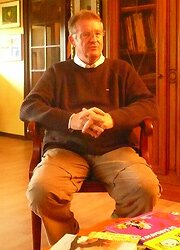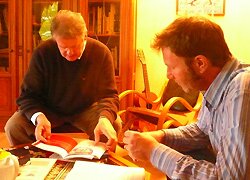Exclusive: Interview with International Rugby Board chairman Bernard Lapasset
by Colin Spiro 29 October 2008
|

Cash fears: Bernard Lapasset
|
Part II: My hopes and fears for the game
"The selector is the agent. The agent is monitoring the game in the world and that is crazy. We need to change that.”
In the second instalment of our exclusive three-part interview with Bernard Lapasset the IRB chairman talks about the Rugby World Cup, spreading the game globally and his concerns about European money unbalancing the sport. (Bernard Lapasset Interview Part I: My Olympic Dream)
Rugby union’s profile has never been higher. Players’ earning powers are continuing to soar, as is the income from sponsors and television, but not everything about rugby’s current status is pleasing the IRB chairman, and he is particularly concerned about the financial strength of British and French clubs.
“The problem of money is difficult because the maximum money is concentrated in Europe. There are a lot of players coming from the southern hemisphere – from South Africa, Australia and New Zealand – and we must be careful because we could destroy the value of players in Europe.
“A lot of people say ‘Oh, Bernard, but the money is in the north’, but the money is not the true value of the game. The value of the game is having players coming through and to promote good players into the national side. We have the money but we don’t have a good system for developing good players in rugby in the north.”
The emerging north-south divide is something that concerns Lapasset greatly, and one he says needs urgent addressing.
“We are not the same calendar in the north and the south, so we could destroy totally the competition in the south. We must think all the time how we are going to promote the game because we are not the best against the bet at the moment,” he warned.
The continuing exodus of southern hemisphere players to Europe – particularly from New Zealand – is clearly worrying him. It may be great for the clubs but the long-term health of the international game could be at risk if Europe hoards all the best players thanks to the strength of euro and the wealthy club owners.
“The selector is no more the Union, the selector is the agent. The agent is monitoring the game in the world and that is crazy. We need to change that,” he warned.
“My concern is to change the format we have at this time – we need to explain that we need to change this. We need a common concept throughout the world, not just in one area because we have the money. No. Money in Europe will destroy the game in the south, that is the short vision we have.”
To that end the IRB is taking positive action and recently announced a programme to plough $100m into developing the game globally.
“That is very important, for rugby is not just about the top 10 Unions, but all the Unions in the world. It’s very important to open a new area for rugby – we need regional organisations for refs, coaches, selectors, players and junior teams. We need more tours and international competitions. We need to make a direct link with some unions.
“We’re working with Romania, Georgia, Russia and India for promoting the game over a long period. This is a new concept put in place two years ago. In India we have a lot of English guys involved but in some countries it’s different, in Mexico for example. In India we have organised the Commonwealth Games with rugby sevens and that’s a massive event. This time I have even been invited, which is a big thing because I am French and we are not even in the Commonwealth.
“We’ve had a rugby sevens World Cup in Dubai, we have created a rugby junior world cup in Kenya. These things are very important and we are using sevens as a way to open the door to 15-a-side. Sevens is more important for the young people. The Hong Kong sevens is fantastic and we to create that in the Olympic movement too. We need young people coming more and more into the sport, and we need sevens to create a good atmosphere for that to happen.”
Some nations are further down that development road than others – such as Japan – and their inclusion in recent World Cups is helping that process of integration.
Having personally overseen the successful 2007 World Cup in France Lapasset knows only too well how hosting such an event can promote the game both internally and externally.
According to a recent report by accountants Deloitte nations wishing to host the Rugby World Cup in 2015 or 2019 could boost their economies by up to £2billion. That is a both a staggering prospect and further confirmation. If any were needed, that rugby union is now a major player in terms of global sports.
The last RWC, held in France in 2007, was recognised as the third largest sporting event in the world, after the Olympics and the football World Cup, and Lapasset was the man charged with organising it.
The resounding success of the tournament not only buoyed the host nation’s coffers, it also helped spread the game’s appeal and further confirmed the continuing development of international teams outside the traditional heartland of rugby’s powerhouses. Who could forget Argentina beating France to take third place? Or the impact of the Pacific Island nations? Or even the sight of American winger Takudzwa Ngwenya beating South African winger Bryan Habana on the outside?
The attraction of hosting such a tournament is obvious and the lobbying is hotting up ahead of the IRB’s decisions for the 2015 and 2019 events. But Lapasset knows first hand how much energy and time it takes to organise a successful event and is keen to give host countries the longest possible period of preparation.
|

Spreading the gospel: Lapasset at home
|
“I started my organisation [of the 2007 RWC] in 1995, so that’s 12 years,” he stressed. “You need time because it’s not just about the games, it’s more than that so that you can get all of the country to support the concept of the World Cup. We needed that, and it wasn’t just a country either, it was a region. In France we welcomed 350,000 people in four weeks from all over Europe.”
The IRB recently confirmed it had received 10 bids for the 2015 and 2019 RWCs, including a left field one from Jamaica.
“I don’t know why they [Jamaica] do that but we’ve received a good proposal from Japan, and Russia could be coming too. They have a good programme and in 10 years from here they could be the place. We need to do that – we need to open the vision for rugby,” said Lapasset.
“My vision is to see the pinnacle of rugby (15s) is the RWC and we need to extend the format during a long period to be sure all the unions have the capacity to improve themselves as an organisation. At the same time we also need to do the same with the links with the governments, media partners and the regions because it is a massive event.
“When I won the right to hold the 2007 RWC in France a lot of people said ‘Oh, France are not so good at this’ but at the end of the day we beat all the record in terms of attendances, television figures and so on,” he says with obvious satisfaction.
Indeed, the 2007 RWC has left a clear legacy in France with attendances and participation both on the increase since throughout the country since the event. Not everyone was initially happy with the regional distribution of the games – especially in Toulouse – but Lapasset said the dividends have proved the decision was right.
“We opened the vision of rugby. In Lens a lot of people came from Belgium, Poland, Finland and Sweden because the TGV made it very easy. In Marseille we had Italians, Australians and Romanians and in the southwest we had Spanish and Portuguese.
“The RWC is an open vision to include more and more people to get to know the game, to know the atmosphere in the stadia and at the end of the event we had no incidents, no smashed cars, no fights in the bars, no fights in the street… nothing. Seven weeks for the tournament and no case at the end. That was marvellous, and that is rugby.”
Bernard Lapasset Interview Part I: My Olympic Dream
Bernard Lapasset Interview Part 3: More Than Just a Game
|